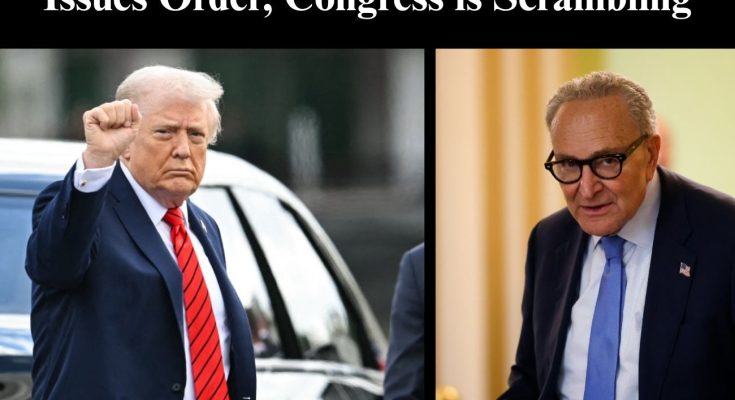
The Senate is meeting to consider a potential deal to end the record-breaking government shutdown, now in its 37th day, as President Donald Trump renews his push for Republicans to eliminate the filibuster — a move he argues is essential to reopen the government and advance the GOP agenda.
According to Politico, Senate Majority Leader John Thune is working to finalize an agreement with Democratic leaders that would amend the House-passed continuing resolution to include three full-year appropriations bills, potentially extending funding through next January.
The plan is designed to draw enough Democratic support to reach the 60 votes currently required under Senate rules.
The shutdown, which began in late September, officially became the longest in U.S. history on Wednesday — surpassing the 34-day closure that occurred during Trump’s first term. With federal workers unpaid for more than a month and vital programs running on emergency reserves, pressure is mounting on lawmakers to strike a deal.
Republican leaders believe the new offer — combining short-term government funding with a package of full-year spending measures — could entice moderate Democrats to vote in favor of reopening the government. Thune told reporters he hopes the proposal will win bipartisan backing but acknowledged that “the outcome is not guaranteed.”
Finalizing the agreement could take several days due to procedural delays and expected objections from both sides.
When asked whether senators would remain in Washington through the weekend, Majority Whip John Barrasso (R-WY) replied, “Yes,” signaling that leadership intends to keep the chamber in session until a resolution is reached.
Democrats held their own closed-door lunch Thursday to discuss strategy but stopped short of announcing support for the proposed compromise. According to CBS News, Democratic negotiators are weighing whether to accept the spending package in exchange for a promised vote on extending health care subsidies — a key party priority heading into 2026.
While talks continue, Trump is urging Senate Republicans to bypass negotiations altogether by eliminating the filibuster, which requires 60 votes to advance most legislation.
Speaking at an Oval Office press conference Thursday, the president said the rule has become an obstacle to conservative governance and warned that Democrats would scrap it immediately if they regained control of the Senate.
“I think it’s time for them to end the filibuster and just put everybody back to work,” Trump said. “Vote in voter ID, vote in no mail-in voting except for the military, far away military and people that are very sick. I’d like to see one-day voting. I’d like to clean up the elections, secure the border, and pass fair immigration laws. We could do it all ourselves — but to do that, you have to end the filibuster.”
Trump said Democrats would not hesitate to change the rules for their own advantage if they regained power. “They’ll do it too. They’ll immediately do it,” he warned. “They’re going to make Puerto Rico a state, they’re going to make D.C. a state, they’re going to pack the court, they’re going to end up with more electoral votes, they’re going to end up with four new senators — and they’re going to do this, 100 percent.”
The comments come one day after Trump clashed with Sen. Lindsey Graham (R-SC) during a breakfast meeting with Senate Republicans at the White House.
In that meeting, Trump told GOP senators that they risked becoming a “dead party” if they refused to terminate the filibuster. Graham argued that Republicans could still use reconciliation to pass certain legislation with a simple majority, but Trump rejected that view, saying, “Lindsey, you and I both know there’s so much you can’t do with reconciliation.”
Despite Trump’s repeated calls, Thune and several senior Senate Republicans have made clear they will not support eliminating the filibuster.
“It’s just not happening,” Thune told reporters Wednesday, reiterating his belief that the rule protects minority rights in the chamber and prevents what he described as “legislative chaos.”
Republicans currently hold a slim majority in the Senate, controlling 52 seats, but the president’s proposal would require a simple majority to change chamber rules — a step that leadership insists is off the table.

